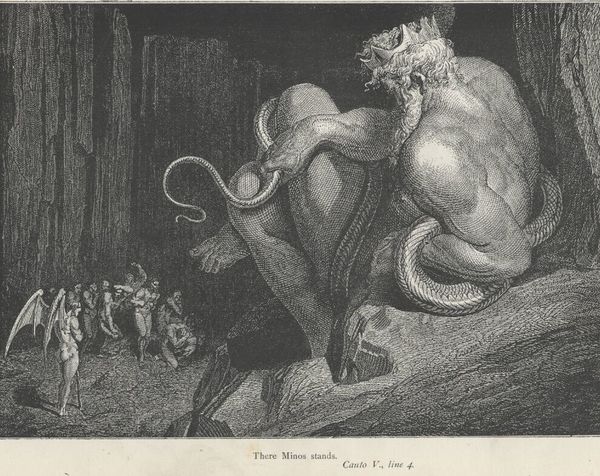Annotation:Minos Court: Difference between revisions
m (Text replacement - "garamond, serif" to "sans-serif") |
No edit summary |
||
| (One intermediate revision by the same user not shown) | |||
| Line 1: | Line 1: | ||
---------- | |||
---- | {{TuneAnnotation | ||
|f_tune_annotation_title= https://tunearch.org/wiki/Annotation:Minos_Court > | |||
'''MINOS COURT.''' English, Country Dance/Jig (6/8 time). F Major. Standard tuning (fiddle). AABB. The melody seems unique to London publishers Samuel, Ann and Peter Thompson's '''Compleat Collection...vol. 5''' (1788). In Greek literature Minos is the king of Knossos, Crete, who is said to have reigned over the main island and adjacent islands three generations before the Trojan War. However, the title may refer to Minos' appearance in Dante Alighieri's '''Divine Comedy''' chapter "Inferno", in which (according to Wikipedia): | |f_annotation=[[File:minos.jpg|600px|thumb|right|Minos sitting in judgement]]'''MINOS COURT.''' English, Country Dance/Jig (6/8 time). F Major. Standard tuning (fiddle). AABB. The melody seems unique to London publishers Samuel, Ann and Peter Thompson's '''Compleat Collection...vol. 5''' (1788). In Greek literature Minos is the king of Knossos, Crete, who is said to have reigned over the main island and adjacent islands three generations before the Trojan War. However, the title may refer to Minos' appearance in Dante Alighieri's '''Divine Comedy''' chapter "Inferno", in which (according to Wikipedia): | ||
<blockquote> | <blockquote> | ||
''Minos is depicted with having a snake-like tail. He sits at the entrance to the second circle in the Inferno, which is the'' ''beginning of Hell proper. Here, he judges the sins of each soul and assigns it to its rightful punishment by indicating the'' ''circle to which it must descend. He does this by circling his tail around his own body the appropriate number of times. He can'' ''also speak, to clarify the soul's location within the circle indicated by the wrapping of his tail.'' [http://en.wikipedia.org/wiki/Minos] | ''Minos is depicted with having a snake-like tail. He sits at the entrance to the second circle in the Inferno, which is the'' ''beginning of Hell proper. Here, he judges the sins of each soul and assigns it to its rightful punishment by indicating the'' ''circle to which it must descend. He does this by circling his tail around his own body the appropriate number of times. He can'' ''also speak, to clarify the soul's location within the circle indicated by the wrapping of his tail.'' [http://en.wikipedia.org/wiki/Minos] | ||
</blockquote> | </blockquote> | ||
|f_source_for_notated_version= | |||
|f_printed_sources=Thompson ('''Compleat Collection of 200 Favourite Country Dances, vol. 5'''), 1788; No. 118, p. 59 | |||
|f_recorded_sources= | |||
|f_see_also_listing= | |||
}} | |||
Latest revision as of 00:47, 25 January 2023
X:1 T:Minos Court M:6/8 L:1/8 R:Country Dance B:Samuel, Ann & Peter Thompson -- Compleat Collection of 200 Favourite Country Dances, vol. 5 (1788, No. 118, p. 59) Z:AK/Fiddler's Companion K:F FGF A2c|f3c3|d2B G2c|A3F3| FGA A2c|f3a3|gfe G2=B|c3-c3:| |:cdc e2g|b3g3|a2f d2g|e3c3| faf c2A|BdB G2B|AGF G2E|F3-F3:|]

Minos is depicted with having a snake-like tail. He sits at the entrance to the second circle in the Inferno, which is the beginning of Hell proper. Here, he judges the sins of each soul and assigns it to its rightful punishment by indicating the circle to which it must descend. He does this by circling his tail around his own body the appropriate number of times. He can also speak, to clarify the soul's location within the circle indicated by the wrapping of his tail. [1]

